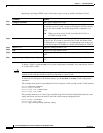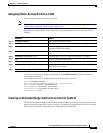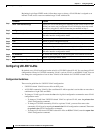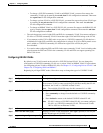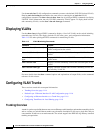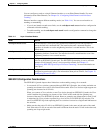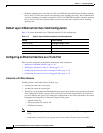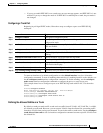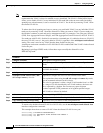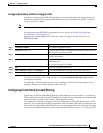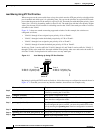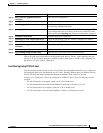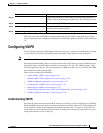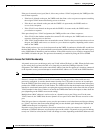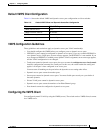
11-18
Cisco ME 3400 Ethernet Access Switch Software Configuration Guide
OL-9639-06
Chapter 11 Configuring VLANs
Configuring VLAN Trunks
Note VLAN 1 is the default VLAN on all trunk ports in all Cisco switches, and it has previously been a
requirement that VLAN 1 always be enabled on every trunk link. The VLAN 1 minimization feature
allows you to disable VLAN 1 on any individual VLAN trunk link so that no user traffic (including
spanning-tree advertisements) is sent or received on VLAN 1. You do this by removing VLAN 1 from
the allowed VLAN list.
To reduce the risk of spanning-tree loops or storms, you can disable VLAN 1 on any individual VLAN
trunk port by removing VLAN 1 from the allowed list. When you remove VLAN 1 from a trunk port,
the interface continues to send and receive management traffic, for example, Cisco Discovery Protocol
(CDP), Port Aggregation Protocol (PAgP), and Link Aggregation Control Protocol (LACP) in VLAN 1.
If a trunk port with VLAN 1 disabled is converted to a nontrunk port, it is added to the access VLAN. If
the access VLAN is set to 1, the port is added to VLAN 1, regardless of the switchport trunk allowed
setting. The same is true for any VLAN that has been disabled on the port.
A trunk port can become a member of a VLAN if the VLAN is enabled and if the VLAN is in the allowed
list for the port.
Beginning in privileged EXEC mode, follow these steps to modify the allowed list of an
IEEE
802.1Q trunk:
To return to the default allowed VLAN list of all VLANs, use the no switchport trunk allowed vlan
interface configuration command.
This example shows how to remove VLAN 2 from the allowed VLAN list on a port:
Switch(config)# interface fastethernet0/1
Switch(config-if)# switchport trunk allowed vlan remove 2
Switch(config-if)# end
Command Purpose
Step 1
configure terminal Enter global configuration mode.
Step 2
interface interface-id Specify the port to be configured, and enter interface configuration
mode.
Step 3
no shutdown Enable the port, if necessary. By default, UNIs and ENIs are disabled,
and NNIs are enabled.
Step 4
switchport mode trunk Configure the interface as a VLAN trunk port.
Step 5
switchport trunk allowed vlan {add |
all | except | remove} vlan-list
(Optional) Configure the list of VLANs allowed on the trunk.
For explanations about using the add, all, except, and remove keywords,
see the command reference for this release.
The vlan-list parameter is either a single VLAN number from 1 to 4094
or a range of VLANs described by two VLAN numbers, the lower one
first, separated by a hyphen. Do not enter any spaces between
comma-separated VLAN parameters or in hyphen-specified ranges.
All VLANs are allowed by default.
Step 6
end Return to privileged EXEC mode.
Step 7
show interfaces interface-id switchport Verify your entries in the Trunking VLANs Enabled field of the display.
Step 8
copy running-config startup-config (Optional) Save your entries in the configuration file.



